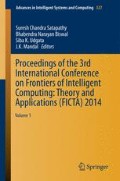Abstract
In this paper, a variant of windowed Huffman coding with limited distinct symbols is proposed. Symbols most recently processed are stored in a window where the number of distinct symbols cannot exceed a specified threshold. But, if the number of distinct symbols exceeds a specified threshold, least recently used symbol is removed from the window instead of oldest symbol of the window. Then, another variant of the method is proposed where instead of single window two windows are used. The most recently processed symbols are kept in a small primary window buffer. A comparatively large secondary window buffer is used to store more past processed symbols. The first proposed technique significantly improves the compression rates of most of the file type. The compression rates of the second proposed technique are not so poor than its counter parts.
Access this chapter
Tax calculation will be finalised at checkout
Purchases are for personal use only
Preview
Unable to display preview. Download preview PDF.
References
Nandi, U., Mandal, J.K.: Windowed Huffman coding with limited distinct symbol. In: 2nd International Conference on Computer, Communication, Control and Information Technology(C3IT), Hooghly, West Bengal, India, vol. 4, pp. 589–594 (2012)
Huang, H.-C., Wu, J.-L.: Windowed Huffman coding algorithm with size adaptation. IEE Proceedings-I 140(2), 109–113 (1993)
Nandi, U., Mandal, J.K.: Region based Huffman (RB H) Compression Technique with Code Interchange. Malayasian Journal of Computer Science (MJCS) 23(2), 111–120 (2010)
Huffman, D.A.: A method for the construction of minimum redundancy codes. Proc. IRE, 1098–1101 (1952)
Faller, N.: An adaptive system for data compression. In: Record of the 7th Asilomar Conference on Circuits, System, and Computers, pp. 593–597 (1973)
Nandi, U., Mandal, J.K.: Region based Huffman (RBH) Compression Technique with Code Interchange. Journal of Computer Science(MJCS) 23(2), 111–120 (2010)
Nandi, U., Mandal, J.K.: Comparative Study And Analysis of Adaptive Region Based Huffman Compression Techniques. International Journal of Information Technology Convergence and Services (IJITCS) 2(4), 17–24 (2012)
Nandi, U., Mandal, J.K.: Region Based Huffman Compression with region wise multiple interchanging of codes. Advancement of modelling & simulation techniques in enterprises(AMSE) 17(2), 44–58 (2012)
Gallager, R.G.: Variations on a theme by Huffman. IEEE Trans. IT 24(6), 668–674 (1978)
Knuth, D.E. Dynamic Huffman coding. J . Algorithms, (6), p 163-170 (1985).
Vitter, J.S.: Dynamic Huffman coding. ACM Trans. Math. SoJt-ware 15(2), 158–167 (1989)
Huang, H.-C., Wu, J.-L.: Design and analysts of residual Huffman algorith. In: National Computer Symposium, Taiwan, pp. 200–205 (1991)
Nandi, U., Mandal, J.K.: Adaptive region based huffman compression technique with selective code interchanging. In: Meghanathan, N., Nagamalai, D., Chaki, N. (eds.) Advances in Computing & Inform. Technology. Advances in Intelligent Systems and Computing, vol. 176, pp. 739–748. Springer, Heidelberg (2012)
Nandi, U., Mandal, J.K.: A Compression Technique Based on Optimality of LZW code(OLZW). In: The Third IEEE International Conference on Computer & Communication Technology (ICCCT-2012), Allahabad, India, pp. 166–170 (2012)
Author information
Authors and Affiliations
Corresponding author
Editor information
Editors and Affiliations
Rights and permissions
Copyright information
© 2015 Springer International Publishing Switzerland
About this paper
Cite this paper
Nandi, U., Mandal, J.K. (2015). Windowed Huffman Coding with Limited Distinct Symbols by Least Recently Used Symbol Removable. In: Satapathy, S., Biswal, B., Udgata, S., Mandal, J. (eds) Proceedings of the 3rd International Conference on Frontiers of Intelligent Computing: Theory and Applications (FICTA) 2014. Advances in Intelligent Systems and Computing, vol 327. Springer, Cham. https://doi.org/10.1007/978-3-319-11933-5_54
Download citation
DOI: https://doi.org/10.1007/978-3-319-11933-5_54
Publisher Name: Springer, Cham
Print ISBN: 978-3-319-11932-8
Online ISBN: 978-3-319-11933-5
eBook Packages: EngineeringEngineering (R0)

